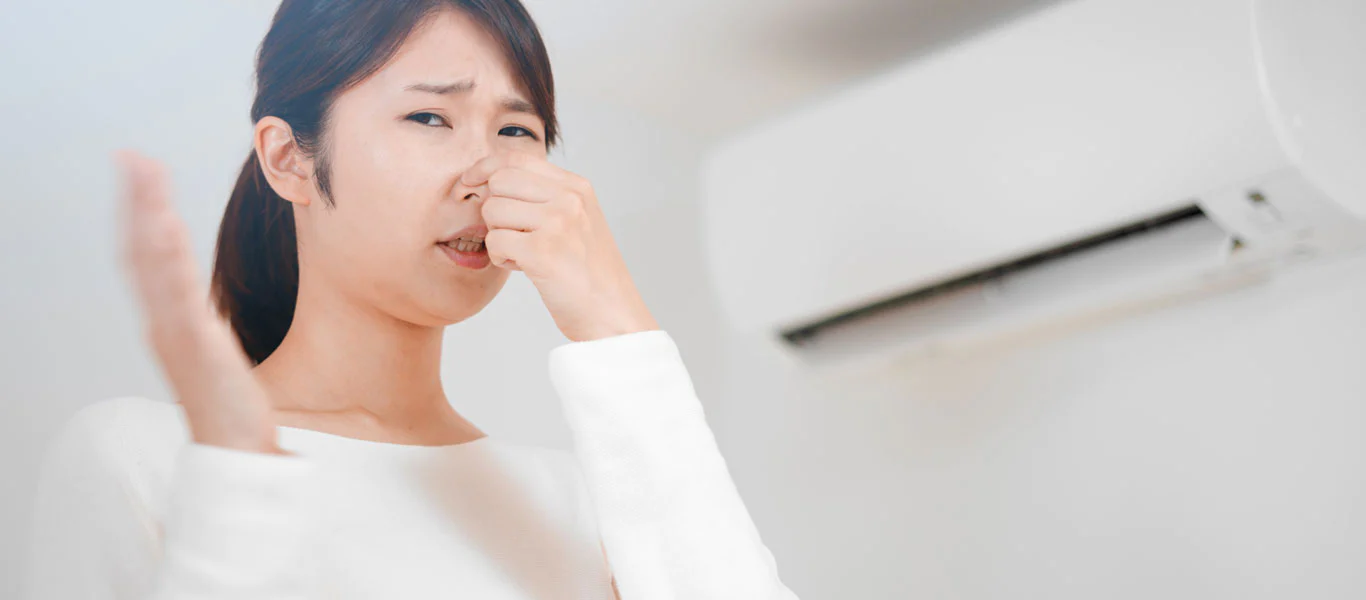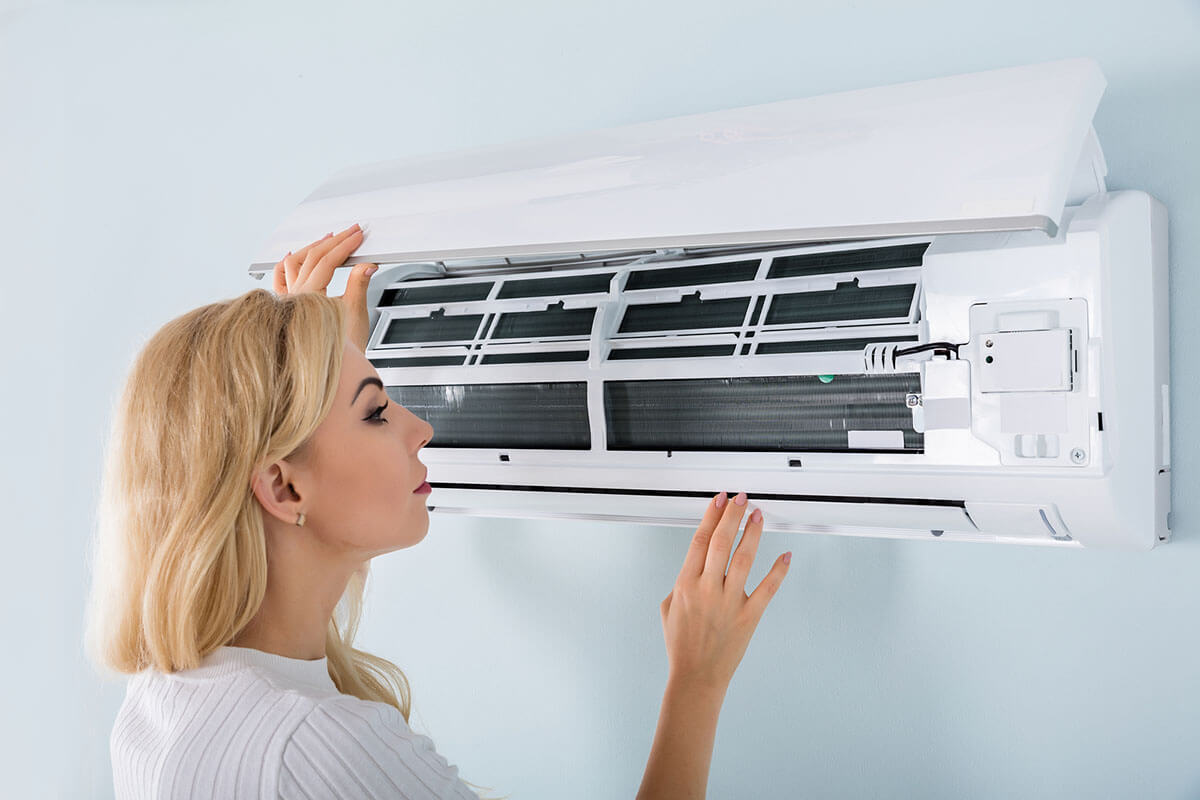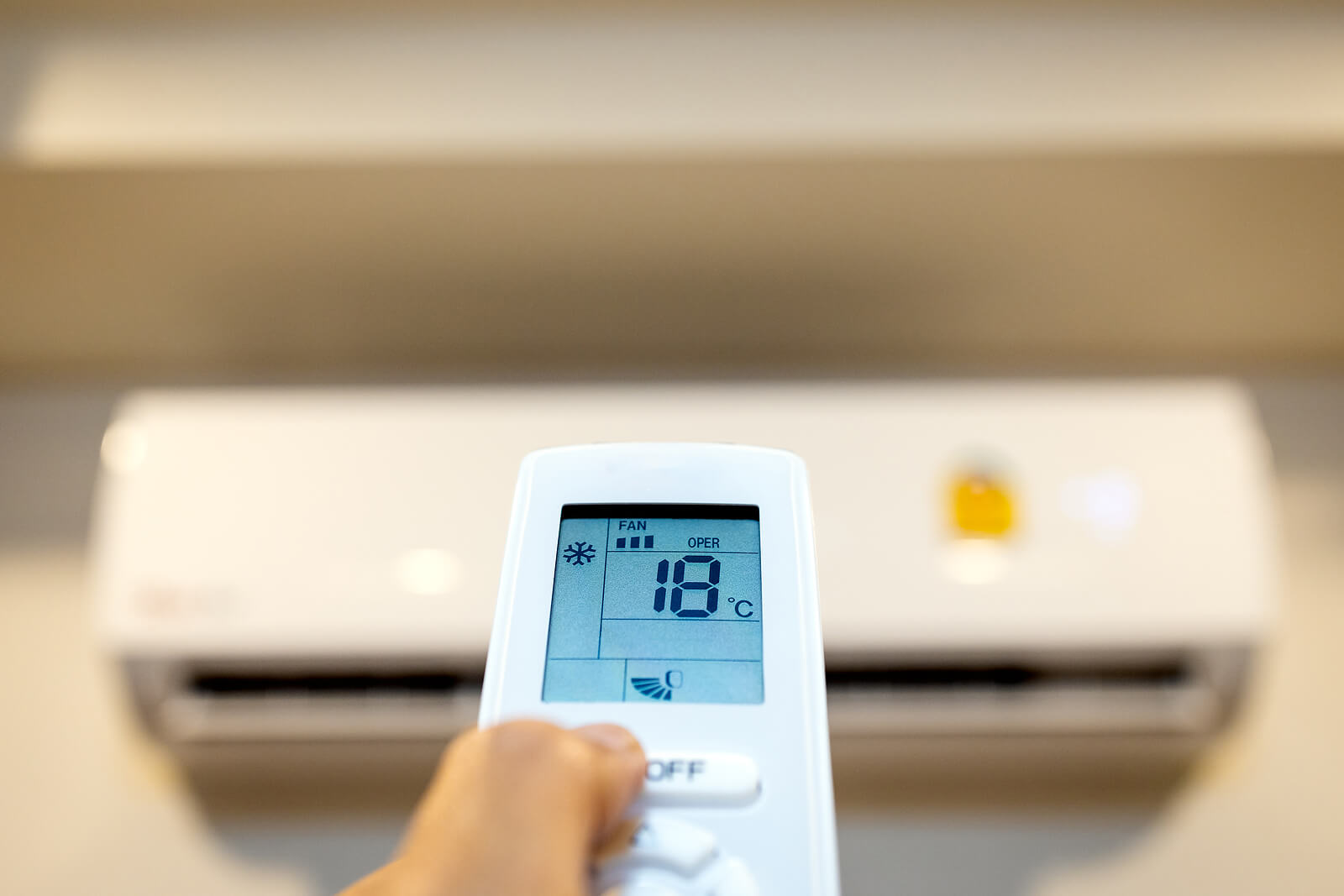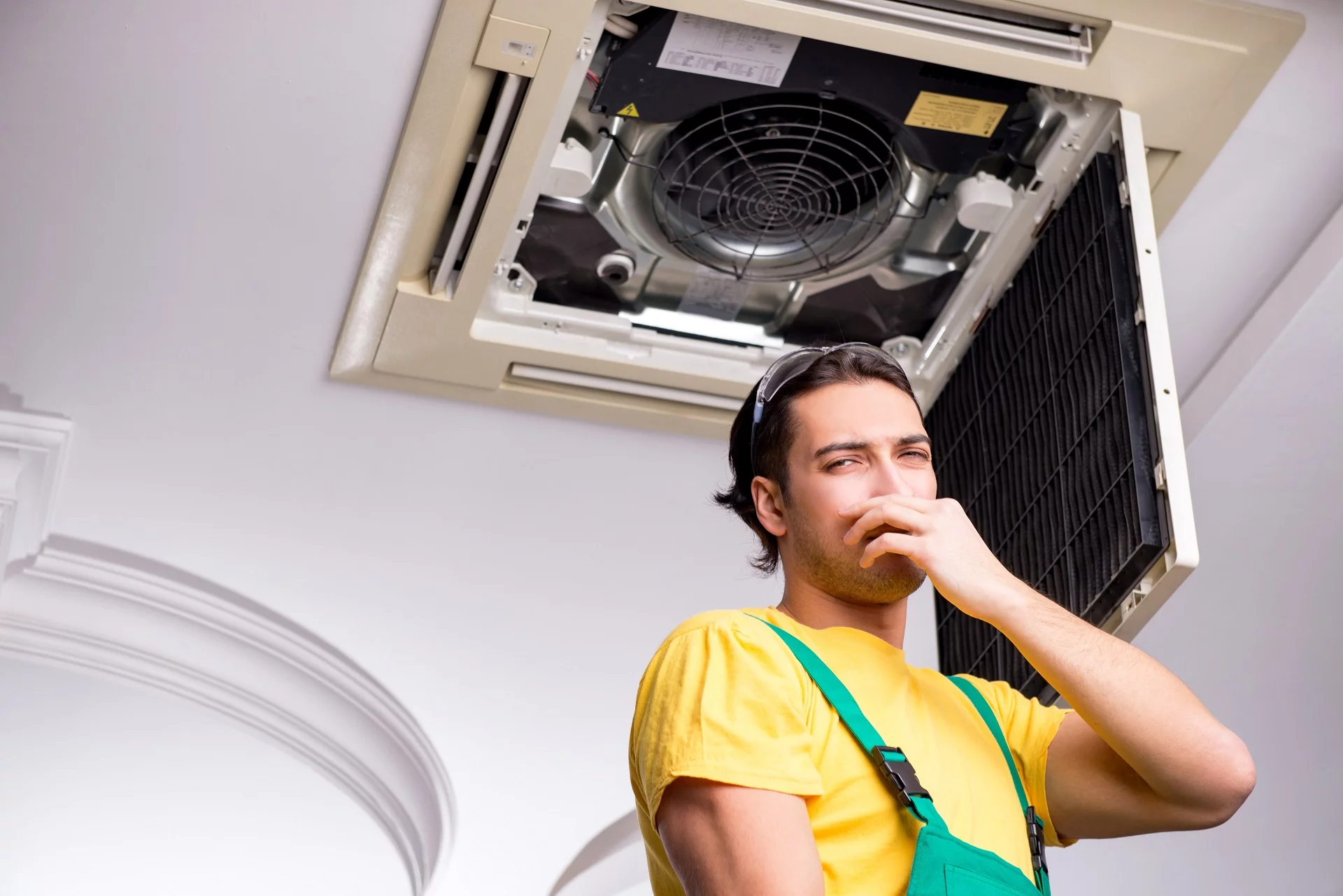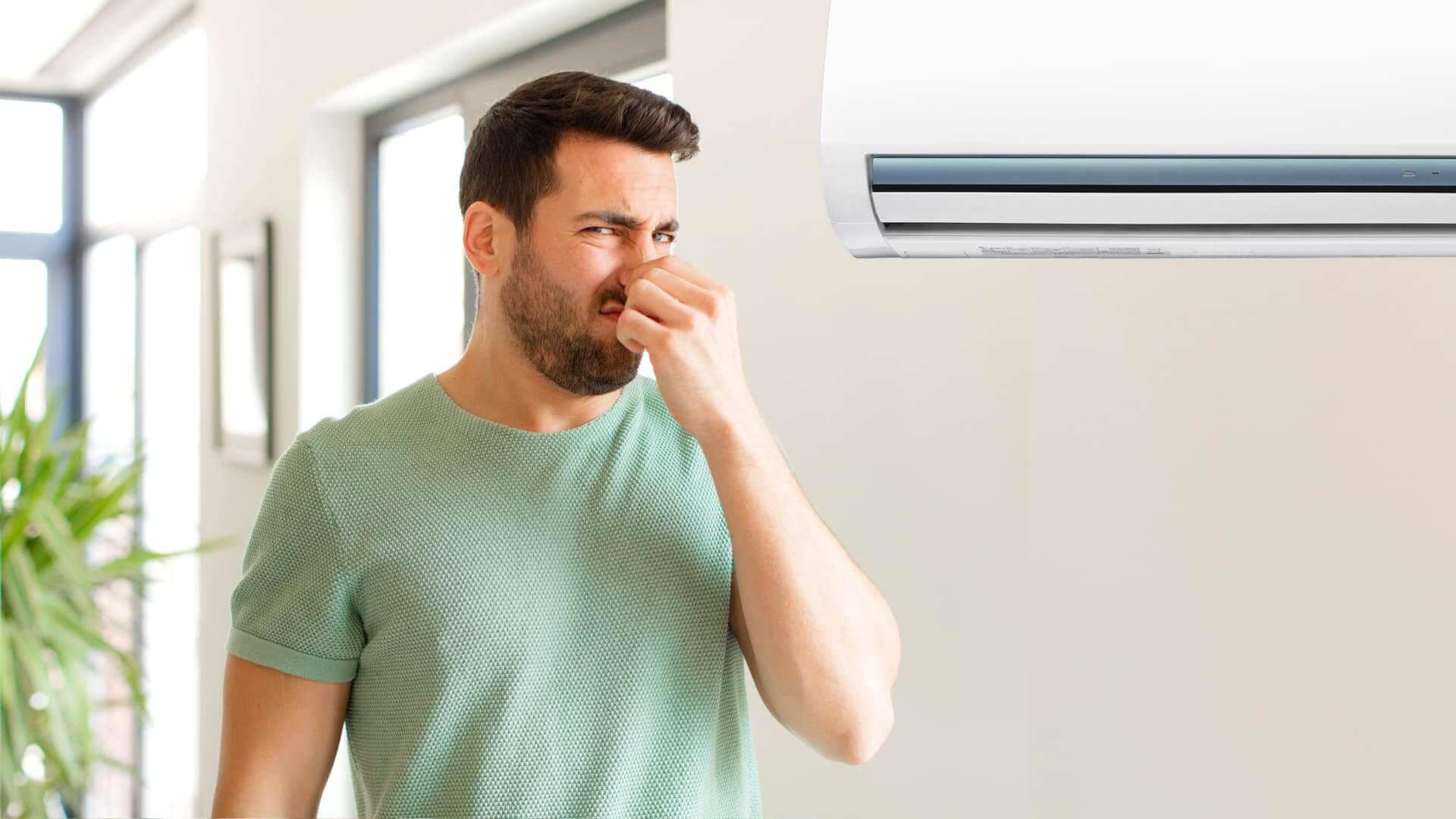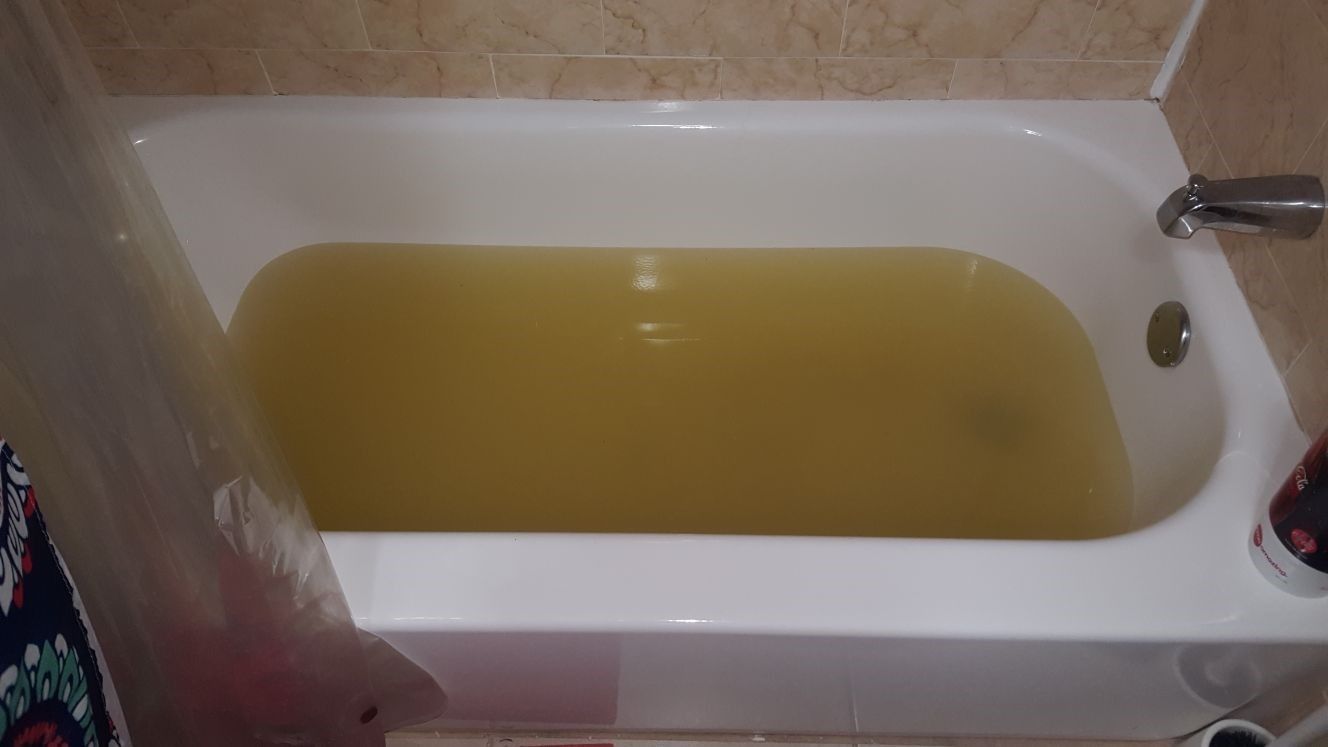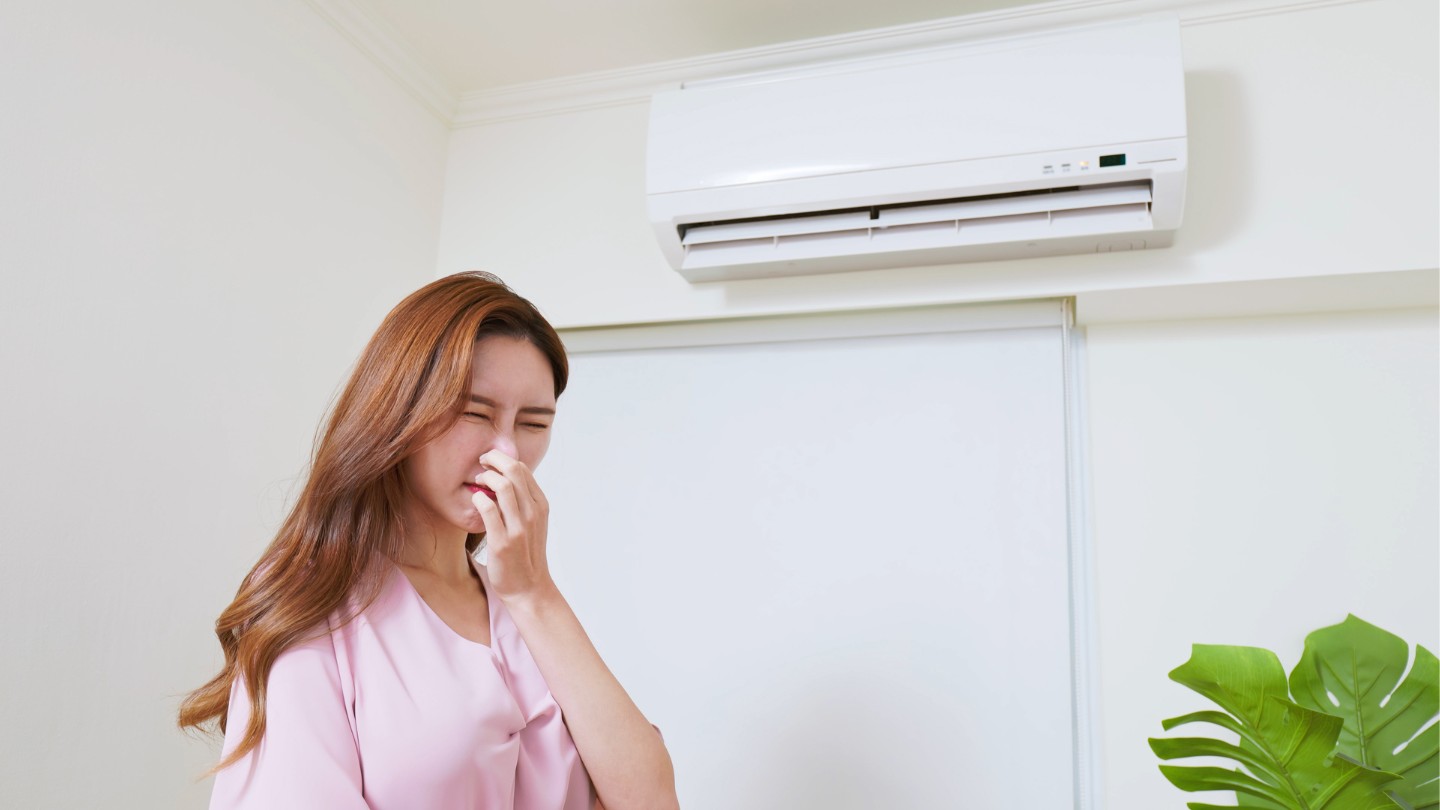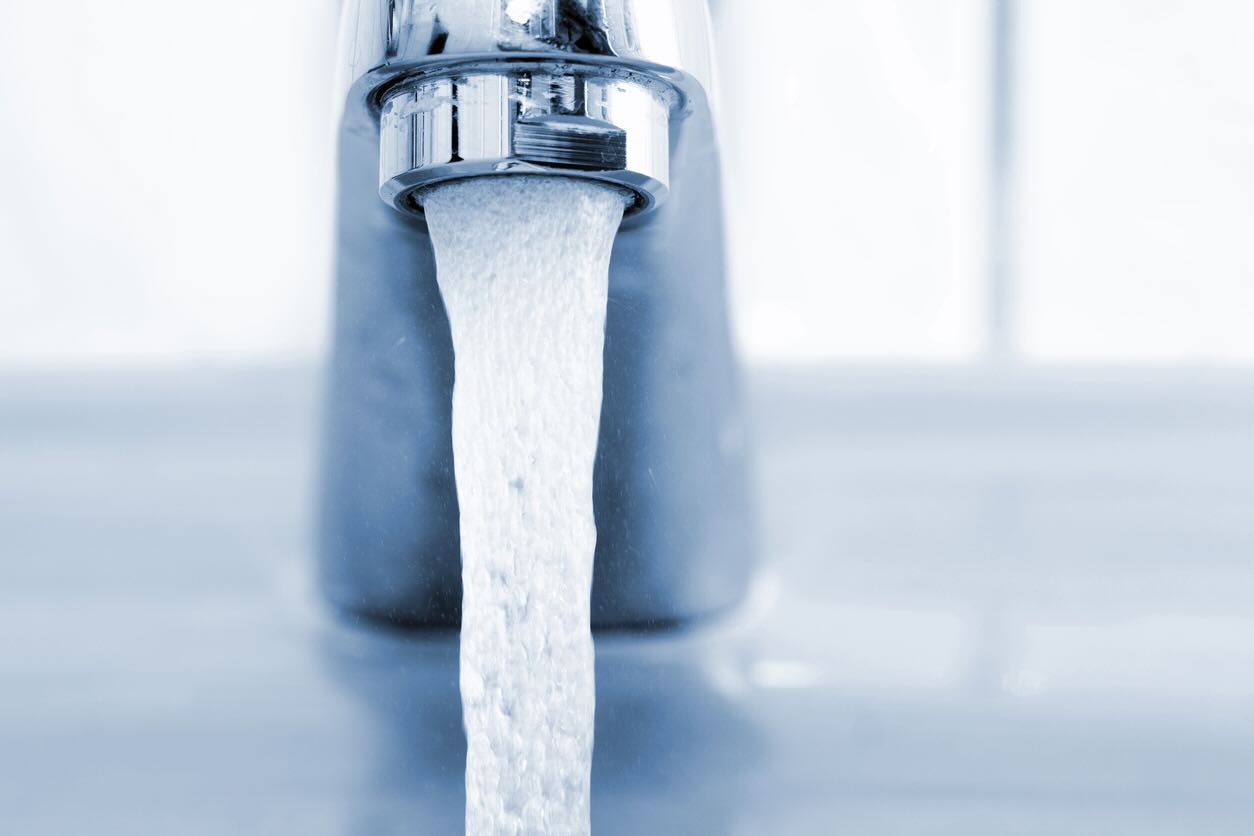Home>Home Maintenance>Why Does My Air Conditioner Smell Like Fish When I Turn It On
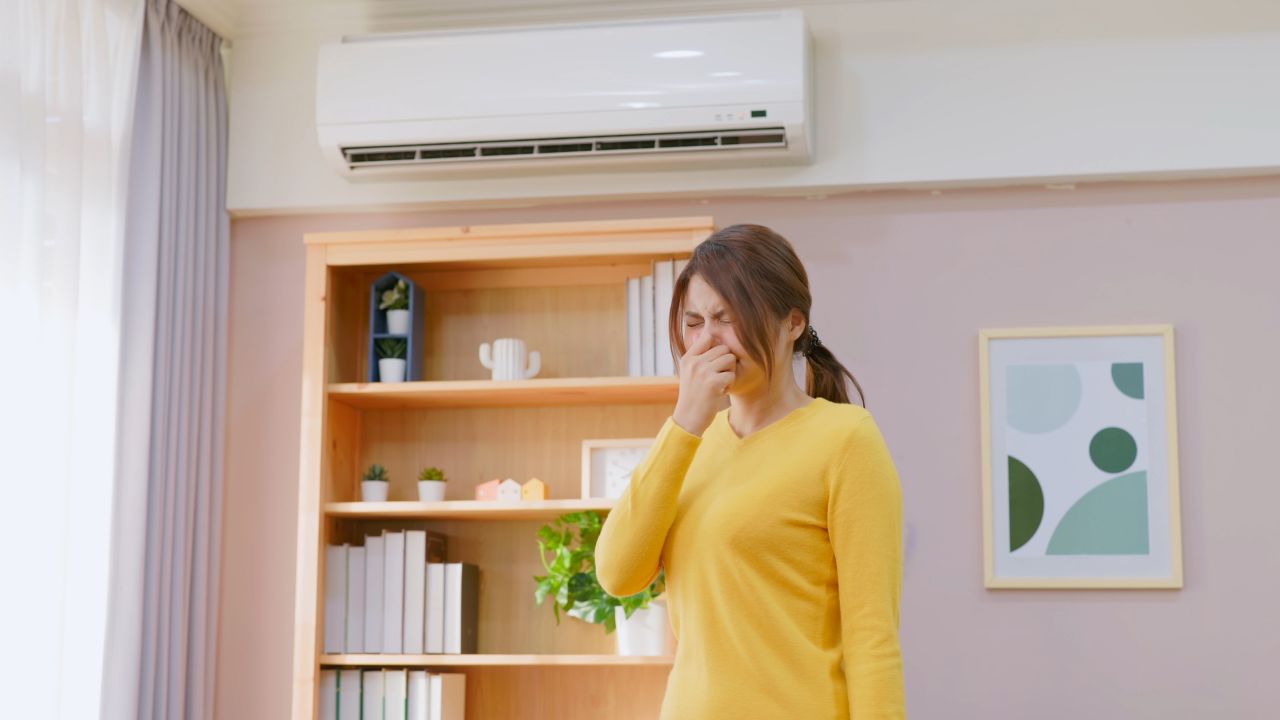

Home Maintenance
Why Does My Air Conditioner Smell Like Fish When I Turn It On
Modified: May 6, 2024
Discover the reasons behind why your air conditioner emits a fishy odor when you switch it on. Explore effective home-maintenance tips to tackle this issue and enjoy fresh, clean air at all times.
(Many of the links in this article redirect to a specific reviewed product. Your purchase of these products through affiliate links helps to generate commission for Storables.com, at no extra cost. Learn more)
Introduction
Welcome to the world of home maintenance, where every day brings a new challenge to conquer and a new victory to savor. One of the most common issues homeowners face is the strange and unpleasant odor emanating from their air conditioner when it’s turned on. And if you’ve ever noticed your air conditioner smelling like fish, you’re not alone. It’s a puzzling problem that can leave you scratching your head, but fear not! We’re here to shed light on this fishy issue and help you find a solution.
Before we dive into the possible causes and solutions, it’s essential to understand why your air conditioner can emit such an unusual smell. Your air conditioning system works by pulling in air from your surroundings, cooling it, and then redistributing it throughout your home. Along the way, various components like filters, coils, and drain pans can accumulate dirt, moisture, and debris, creating an ideal breeding ground for bacteria, mold, and mildew. These microorganisms can release volatile organic compounds (VOCs), which can result in unpleasant odors.
Now that we have a basic understanding of why your air conditioner might smell like fish, let’s explore some of the possible causes. It’s important to note that while many of these issues can be addressed by homeowners, some may require professional assistance. Please exercise caution and seek professional help if needed.
Key Takeaways:
- Keep your air conditioner smelling fresh by regularly cleaning or replacing the air filters to prevent the buildup of dirt and debris, which can cause a fishy odor when the AC is running.
- Address potential mold, mildew, or drain pan issues promptly to eliminate the fishy smell in your air conditioner and maintain a healthy indoor environment. Regular maintenance is key to preventing odors.
Understanding the Fishy Odor
Before we delve into the possible causes of a fishy smell in your air conditioner, it’s crucial to understand the nature of this odorous dilemma. When your air conditioner emits a fishy scent, it can be indicative of various underlying issues within the system. The odor can range from a slight fishy whiff to an overpowering stench that permeates your entire home.
The fishy odor is typically the result of organic matter decomposing within your air conditioning unit. This decomposition can occur due to factors such as stagnant water, dirt, debris, or even the growth of mold and mildew. As these organic materials break down, they release volatile organic compounds (VOCs), which produce the distinct fishy smell.
It’s important to note that the fishy odor could also be a sign of an electrical issue within your air conditioner. In some cases, overheating wires or faulty electrical components can emit an odor that resembles fish. This particular scenario requires immediate attention from a professional to avoid any potential safety hazards.
Understanding the fishy odor is the first step in resolving the issue. By identifying the specific cause, you can take appropriate measures to eliminate the odor and restore a fresh, pleasant scent to your home environment. In the following sections, we will explore the potential causes of a fishy smell and provide solutions for each scenario.
Possible Causes of a Fishy Smell
When your air conditioner emits a fishy smell, there are several potential causes to consider. Identifying the root cause is crucial in order to address the issue effectively. Here are some possible culprits:
- Dirty Air Filters: Air filters play a vital role in trapping dust, debris, and pollutants from the air. Over time, these filters can become clogged, causing restricted airflow and a buildup of organic matter. As a result, the trapped debris can produce a fishy odor when the air conditioner is running.
- Mold or Mildew Growth: Moisture is a breeding ground for mold and mildew. If moisture accumulates in certain parts of your air conditioning system, such as the evaporator coils or the condensate drain pan, it can promote the growth of these microorganisms. The decomposition of mold and mildew can release a fishy odor when the air conditioner is in operation.
- Drain Pan Issues: The drain pan collects the condensation that forms on the evaporator coils and helps channel it outside your home. However, if the drain pan becomes clogged or damaged, stagnant water can accumulate, leading to the growth of bacteria, mold, and mildew. This can result in a fishy smell when the air conditioner is turned on.
- Electrical Problems: In some cases, a fishy odor emanating from your air conditioner could indicate an electrical issue. Overheating wires, faulty capacitors, or burnt-out components can release an odor that resembles fish. Electrical problems require immediate attention from a professional to prevent potential safety hazards.
It’s important to note that these causes are not exclusive and there may be other factors contributing to the fishy smell. By understanding these possibilities, you can take appropriate steps to troubleshoot and resolve the issue. In the following sections, we will discuss how to address each potential cause and provide solutions to eliminate the fishy odor from your air conditioning system.
Dirty Air Filters
One of the most common causes of a fishy smell in your air conditioner is dirty air filters. Air filters are responsible for trapping dust, pollen, pet dander, and other airborne particles. Over time, these filters can become clogged with debris, limiting airflow and reducing the effectiveness of your air conditioner. In addition to affecting the air quality in your home, dirty air filters can also lead to unpleasant odors.
When air filters become dirty, organic matter such as dust and dirt can accumulate on them. The decomposition of this organic matter can create a fishy odor that is then circulated throughout your home when the air conditioner is running. Fortunately, addressing this issue is relatively simple and doesn’t require professional assistance.
To eliminate the fishy smell caused by dirty air filters, follow these steps:
- Locate the air filters: Air filters are typically located behind a grille or panel in your air conditioning system. Check the user manual or consult a professional if you’re unsure where to find them.
- Turn off the air conditioner: Before removing and cleaning or replacing the air filters, make sure to turn off the power to the air conditioning system.
- Remove the air filters: Gently remove the air filters from their designated location. Take note of the direction in which they are installed, as they will need to be placed back correctly.
- Clean or replace the air filters: Depending on the type of air filters you have, you can clean them or replace them altogether. If they are reusable, use a vacuum cleaner or rinse them with water to remove the accumulated dirt and debris. Let them dry completely before reinstalling them. For disposable filters, replace them with new ones.
- Reinstall the air filters: Once the air filters are cleaned or replaced, carefully put them back into their correct position. Make sure they are securely in place.
- Turn on the air conditioner: After reinstalling the air filters, turn on the power to the air conditioning system and let it run. You should notice an improvement in the air quality and the elimination of the fishy odor.
It’s important to clean or replace your air filters regularly to prevent the recurrence of the fishy smell and ensure the optimal performance of your air conditioner. The frequency of filter maintenance will depend on various factors, such as the type of filters and the level of air pollutants in your home. Check the manufacturer’s recommendations or consult with a professional for guidance.
By addressing dirty air filters, you have taken an important step towards eliminating the fishy smell in your air conditioner. However, if the odor persists, it may be necessary to explore other potential causes and solutions. In the following sections, we will discuss additional steps you can take to resolve this issue.
Mold or Mildew Growth
Another common cause of a fishy smell in your air conditioner is mold or mildew growth. The presence of moisture within your air conditioning system can create the perfect environment for these microorganisms to thrive. If left unchecked, mold and mildew can not only produce an unpleasant odor but also pose risks to your health.
To address mold or mildew growth and eliminate the fishy smell, follow these steps:
- Inspect the evaporator coils: The evaporator coils are responsible for cooling the air that passes through your air conditioning system. Over time, these coils can accumulate dirt, debris, and moisture, creating an ideal breeding ground for mold and mildew. Inspect the coils for signs of mold or mildew growth.
- Clean the evaporator coils: If you notice mold or mildew growth on the evaporator coils, it’s essential to clean them thoroughly. Start by turning off the power to the air conditioning system. Then, use a soft brush or a cloth to gently remove the visible mold or mildew. You can also use a mixture of water and mild detergent to clean the coils. Be sure to rinse them with clean water and allow them to dry completely before turning the system back on.
- Check the condensate drain pan: The condensate drain pan collects the moisture that forms when your air conditioner cools the air. Over time, this pan can become clogged with dirt, debris, or algae, creating a breeding ground for mold and mildew. Inspect the drain pan for any blockages or signs of mold or mildew.
- Clean or replace the condensate drain pan: If you find mold or mildew growth or notice a clog in the condensate drain pan, it’s important to clean or replace it. For minor blockages, you can use a mixture of water and bleach to clean the pan. Rinse it thoroughly and ensure it is completely dry before reinstalling it. If the mold or mildew growth is extensive, consider replacing the drain pan altogether.
- Prevent future mold or mildew growth: To prevent mold and mildew growth in the future, it’s important to address any sources of excess moisture in your air conditioning system. Ensure that the system is properly insulated and that there are no leaks or drips. Additionally, consider using a dehumidifier in areas with high humidity to reduce moisture levels.
Regular maintenance and cleaning of the evaporator coils and condensate drain pan are crucial in preventing mold and mildew growth and eliminating the fishy smell. If the odor persists or if you’re unsure about performing these tasks yourself, it’s recommended to seek professional assistance. They can ensure a thorough cleaning and address any underlying issues that may contribute to mold or mildew growth.
By taking these steps to address mold or mildew growth, you’re making significant progress in resolving the fishy smell in your air conditioner. However, if the odor persists, there are still more potential causes to explore. In the following sections, we will discuss additional solutions to eliminate the fishy smell and restore a fresh, pleasant scent to your home environment.
Read more: When I Turn On My Air Conditioner, It Smells
Drain Pan Issues
One of the potential causes of a fishy smell in your air conditioner is issues with the condensate drain pan. This pan plays a crucial role in collecting the condensation that forms on the evaporator coils and safely draining it outside your home. However, if the drain pan becomes clogged or damaged, stagnant water can accumulate, leading to the growth of bacteria, mold, and mildew. This, in turn, can result in a fishy odor when the air conditioner is turned on.
To address drain pan issues and eliminate the fishy smell, follow these steps:
- Locate the condensate drain pan: The drain pan is typically located beneath the evaporator coils or near the air handler unit. Refer to the user manual or consult a professional if you’re unsure about its location.
- Inspect the drain pan: Check the drain pan for any visible signs of clogs, debris, or mold and mildew growth. A clogged or dirty drain pan can be a breeding ground for bacteria and fungi, leading to the fishy odor.
- Clean the drain pan: If you notice a clog or the presence of debris, carefully remove the drain pan and clean it. Start by turning off the power to the air conditioning system. Use a mixture of water and mild detergent to scrub the pan and remove any debris or buildup. Rinse it thoroughly with clean water and ensure it is completely dry before reinstalling it.
- Check the drain line: While inspecting the drain pan, also check the drain line. This line is responsible for carrying the collected condensation from the drain pan to the outside of your home. Ensure there are no clogs, blockages, or damage to the drain line. If necessary, you can use a pipe cleaner or a combination of water and bleach to clear any obstructions.
- Prevent future drain pan issues: To prevent future clogs or issues with the drain pan, consider installing a drain pan float switch. This switch will automatically shut off the air conditioning system if it detects an overflow or clog in the drain pan, preventing water damage and the growth of bacteria or mold.
Regular maintenance and cleaning of the drain pan are crucial in preventing the fishy smell caused by stagnant water and organic matter. If you’re unsure about performing these tasks yourself or if the odor persists despite cleaning the drain pan, it’s recommended to seek professional assistance. They can thoroughly inspect and clean the drain pan, as well as address any underlying issues that may contribute to clogs or damage.
By addressing drain pan issues and ensuring its proper functioning, you’re taking significant steps toward eliminating the fishy smell in your air conditioner. However, if the odor still persists, there may be other potential causes to consider. In the following sections, we will discuss additional troubleshooting steps and solutions to help you resolve this lingering issue.
Electrical Problems
While uncommon, electrical problems can be another potential cause of a fishy smell in your air conditioner. Overheating wires, faulty capacitors, or burnt-out components can release an odor that resembles fish. If you notice a distinct fishy smell coming from your air conditioner and suspect an electrical issue, it’s crucial to address it promptly to prevent any potential safety hazards.
Dealing with electrical problems can be dangerous and should only be done by a qualified professional. Here are a few steps you can take to address potential electrical issues:
- Turn off the power: If you suspect an electrical problem, it’s important to turn off the power to your air conditioning system immediately. Locate the main power switch or circuit breaker dedicated to the air conditioner and switch it off.
- Inspect for visible damage: Carefully examine your air conditioner for any visible signs of damage, such as frayed wires, burnt components, or discolored connectors. Take note of any noticeable issues and avoid touching any exposed wires or components.
- Call a professional: When it comes to electrical problems, it’s best to leave the repairs to a qualified HVAC technician or electrician. Contact a professional who specializes in air conditioning systems and explain the issue you’re experiencing. They will have the expertise and tools necessary to diagnose and fix any electrical problems safely.
- Follow safety precautions: While waiting for the professional to arrive, ensure that you and your family are safe by keeping a safe distance from the air conditioner and refraining from attempting any repairs yourself. Remember, electrical issues can be hazardous, and it’s always best to leave them to the professionals.
Resolving electrical problems requires specialized knowledge and expertise. It’s crucial to engage the services of a licensed professional to accurately diagnose the issue and carry out any necessary repairs. By doing so, you can ensure the safety and proper functioning of your air conditioning system.
Addressing electrical problems may be the solution to eliminating the fishy smell in your air conditioner. However, if the odor persists even after addressing potential electrical issues, it’s essential to explore other potential causes and solutions. In the following sections, we will discuss additional troubleshooting steps and when it may be necessary to call a professional for assistance.
To get rid of the fishy smell from your air conditioner, try cleaning or replacing the air filter, cleaning the evaporator coil, and checking for any mold or mildew in the unit. This can help improve the air quality and eliminate the unpleasant odor.
Troubleshooting and Solutions
If you’ve gone through the possible causes we’ve discussed so far and the fishy smell in your air conditioner persists, it’s time to continue troubleshooting and exploring additional solutions. Here are some steps you can take to further address and eliminate the odor:
- Check for leaks: Inspect your air conditioning system for any signs of leaks. Leaking refrigerant or water can contribute to the development of mold, mildew, and bacteria, resulting in unpleasant odors. If you detect any leaks, it’s best to contact a professional to identify the source and repair it.
- Inspect the ductwork: Leaky or damaged ductwork can allow contaminants, moisture, and odors to enter your home. Inspect your ductwork for any signs of damage or leaks and seal them properly. Additionally, consider having your ductwork professionally cleaned to remove any accumulated debris or mold that could contribute to the odor.
- Address outdoor factors: Sometimes, external factors can impact the odor inside your home. For example, if there’s a fish market or seafood restaurant nearby, the smell can find its way inside through the air intake of your air conditioner. In such cases, it may be necessary to improve ventilation or use air purifiers to mitigate the odor.
- Consider professional maintenance: If you’ve exhausted all troubleshooting steps and the fishy odor persists, it may be time to call in a professional HVAC technician for a comprehensive inspection and maintenance. They can identify any underlying issues and provide the necessary solutions to eliminate the odor.
Remember, the specific solution to eliminate the fishy smell in your air conditioner will depend on the root cause. It’s crucial to approach troubleshooting systematically and consider seeking professional assistance if needed.
While troubleshooting, it’s also important to note that regular preventative maintenance can help avoid issues that lead to odors in the first place. Properly maintaining your air conditioning system, including regular filter changes, cleaning coils, and maintaining drainage systems, can go a long way in preventing the growth of mold, mildew, and other potential sources of odors.
By following these troubleshooting steps and seeking the help of professionals when necessary, you’ll be well on your way to resolving the fishy smell in your air conditioner and enjoying fresh, clean air in your home once again.
Cleaning or Replacing Air Filters
One of the common causes of a fishy smell in your air conditioner is dirty air filters. Over time, air filters can become clogged with dust, debris, and other particles, obstructing proper airflow and leading to unpleasant odors. Cleaning or replacing the air filters is a simple and effective way to eliminate the fishy smell and improve indoor air quality.
Here’s a step-by-step guide on how to clean or replace your air filters:
- Locate the air filters: The air filters are typically located behind a grille or panel in your air conditioning system. Refer to your user manual or consult a professional if you’re unsure about their location.
- Turn off the power: Before removing the air filters, make sure to turn off the power to your air conditioning system. This ensures your safety during the cleaning or replacement process.
- Remove the air filters: Carefully remove the air filters from their designated location. Take note of the direction in which they’re installed, as they need to be put back correctly.
- Clean the air filters: If your air filters are reusable, you can clean them to remove the accumulated dirt and debris. Start by gently tapping them to loosen the dust. Then, use a vacuum cleaner with a brush attachment to remove the remaining dirt. If the filters are heavily soiled, you can wash them with warm water and mild detergent. Rinse thoroughly and allow them to dry completely before reinstalling.
- Replace the air filters: If your air filters are disposable or heavily damaged, it’s best to replace them with new ones. Purchase the correct size and type of air filters for your specific air conditioning system. Insert the new filters into their designated slots, ensuring they fit securely.
- Turn on the power: After cleaning or replacing the air filters, turn the power back on to your air conditioning system. The improved airflow will help eliminate the fishy smell and enhance the overall efficiency of your system.
It’s essential to clean or replace your air filters regularly to maintain good indoor air quality and prevent odors. The frequency of filter maintenance depends on factors such as the type of filters and the level of pollutants in your home. Check the manufacturer’s recommendations or consult a professional for guidance.
By cleaning or replacing your air filters, you’re ensuring proper airflow and preventing the buildup of dirt and debris that can cause unpleasant odors. This simple maintenance task can significantly improve your air conditioner’s performance and the overall air quality in your home.
If the fishy smell persists even after cleaning or replacing the air filters, it’s recommended to explore other potential causes or seek the assistance of a professional HVAC technician. They can help identify the root cause and provide appropriate solutions to eliminate the odor.
Eliminating Mold and Mildew
Mold and mildew can be a common cause of the fishy smell in your air conditioner. Moisture and a buildup of organic material provide a favorable environment for these microorganisms to thrive. To eliminate mold and mildew and get rid of the fishy odor, follow these steps:
- Identify the source: Inspect your air conditioner for signs of mold or mildew growth. Check areas like the evaporator coils, air ducts, and condensate drain pan where moisture can accumulate.
- Clean the affected areas: If you spot mold or mildew growth, it’s crucial to clean the affected areas promptly. Begin by turning off the power to your air conditioning system. Use a mixture of water and mild detergent to scrub away the mold or mildew. For stubborn growth, you can use a solution of one part bleach to ten parts water. Take caution not to damage any delicate components.
- Rinse and dry: After cleaning, rinse the area thoroughly with clean water to remove any remaining detergent or bleach solution. Ensure all parts are completely dry before turning the system back on.
- Prevent future mold and mildew growth: To prevent mold and mildew from reappearing, address any underlying issues that promote moisture accumulation. Check for leaks or sources of excess moisture and repair them promptly. Consider using a dehumidifier in areas where humidity is high to maintain optimal moisture levels.
- Schedule regular maintenance: Regular maintenance is key to preventing the development of mold and mildew. Have your air conditioning system inspected and serviced by a professional at least once a year. They can clean and disinfect the system, ensuring it remains free of mold and mildew.
It’s important to prioritize safety when dealing with mold and mildew. If the growth is extensive or you’re unsure about cleaning it yourself, it’s recommended to seek the assistance of a professional. They have the expertise and proper equipment to effectively eliminate mold and mildew and ensure your safety.
By promptly addressing mold and mildew growth and maintaining a clean, moisture-free air conditioning system, you can successfully eliminate the fishy odor and contribute to a healthier indoor environment.
If the fishy smell persists or you’re unable to locate and address the source of the odor, it may be necessary to explore other potential causes or consult with a professional HVAC technician to ensure a comprehensive and accurate solution.
Checking and Cleaning the Drain Pan
The drain pan in your air conditioner plays a crucial role in collecting the condensation that forms on the evaporator coils. However, if the drain pan becomes clogged or dirty, it can lead to the growth of bacteria, mold, and mildew, resulting in a fishy odor. To eliminate the odor and ensure proper drainage, follow these steps to check and clean the drain pan:
- Locate the drain pan: The drain pan is typically located beneath the evaporator coils or near the air handler unit. Refer to your user manual or consult a professional if you’re unsure about its location.
- Turn off the power: Before inspecting or cleaning the drain pan, it’s important to turn off the power to your air conditioning system. This ensures your safety during the process.
- Inspect the drain pan: Examine the drain pan for any visible signs of clogs, debris, or mold and mildew. A clogged or dirty drain pan can contribute to unpleasant odors and hinder proper drainage.
- Clean the drain pan: If you notice any clogs or accumulation of debris in the drain pan, it’s necessary to clean it. Start by carefully removing the drain pan. Use a mixture of warm water and mild detergent to scrub away the dirt and grime. Pay special attention to any visible mold or mildew growth and clean it thoroughly. Rinse the drain pan with clean water to remove any remnants of detergent.
- Check the drain line: While inspecting the drain pan, also check the drain line. This line is responsible for carrying the condensation from the drain pan to the outside of your home. Ensure there are no blockages, clogs, or damage to the drain line. If necessary, use a pipe cleaner or a combination of water and bleach to clear any obstructions.
- Dry and re-install the drain pan: Once the drain pan is clean and free of debris, dry it thoroughly. Make sure it is completely dry before re-installing it in its designated location. Ensure the drain pan fits securely and is in the correct position.
- Turn on the power: After cleaning and re-installing the drain pan, turn the power back on to your air conditioning system. Proper drainage will help eliminate the fishy smell and prevent future issues caused by a clogged drain pan.
Regular maintenance and cleaning of the drain pan are essential in preventing the growth of bacteria, mold, and mildew and eliminating the fishy odor. If you’re unsure about performing these tasks yourself or if the odor persists despite cleaning the drain pan, it’s recommended to seek professional assistance. They can thoroughly inspect and clean the drain pan, as well as address any underlying issues that may contribute to clogs or damage.
By ensuring a clean and properly functioning drain pan, you’re taking a significant step toward eliminating the fishy smell in your air conditioner. However, if the odor persists or you’ve exhausted all troubleshooting steps, it may be necessary to explore other potential causes or seek the help of a professional HVAC technician for a comprehensive inspection.
Addressing Electrical Issues
In rare cases, a fishy smell coming from your air conditioner could be indicative of electrical issues. Overheating wires, faulty capacitors, or burnt-out components can release an odor resembling fish. If you suspect an electrical problem, it’s important to address it promptly to prevent any potential safety hazards. However, dealing with electrical issues requires specialized knowledge and expertise, so it’s best to leave the repairs to a qualified professional.
Here are some steps to address potential electrical issues:
- Turn off the power: If you suspect an electrical problem, the first step is to turn off the power to your air conditioning system. Locate the main power switch or circuit breaker dedicated to the air conditioner and switch it off.
- Inspect for visible damage: Carefully examine your air conditioner for any visible signs of electrical damage, such as frayed wires, burnt components, or discolored connectors. Take note of any noticeable issues and avoid touching any exposed wires or components.
- Call a professional: When it comes to electrical problems, it’s crucial to seek the assistance of a qualified HVAC technician or electrician. Contact a professional who specializes in air conditioning systems and explain the issue you’re experiencing. They will have the expertise and tools necessary to diagnose and fix any electrical problems safely.
- Follow safety precautions: While waiting for the professional to arrive, ensure that you and your family are safe by keeping a safe distance from the air conditioner and refraining from attempting any repairs yourself. Remember, electrical issues can be hazardous, and it’s always best to leave them to the professionals.
Addressing electrical issues requires the expertise of a licensed professional. They can accurately diagnose the problem, perform the necessary repairs, and ensure the safety and proper functioning of your air conditioning system. Attempting to fix electrical problems yourself can lead to further damage or risk of electrocution, so it’s essential to leave such tasks to qualified professionals.
If you suspect an electrical issue in your air conditioner, it’s best to act promptly to prevent any potential risks. Contact a professional as soon as possible to schedule an inspection and repairs. They will be able to pinpoint the root cause of the problem and provide the necessary solutions to restore your air conditioner’s functionality.
By addressing electrical issues with the help of professionals, you can ensure the safety and reliable operation of your air conditioning system, ultimately eliminating the fishy smell and creating a comfortable environment in your home.
Calling a Professional
If you’ve attempted troubleshooting steps and the fishy smell in your air conditioner persists, or if you’re uncomfortable with performing maintenance tasks yourself, it’s time to consider calling a professional for assistance. HVAC technicians specialize in diagnosing and resolving issues with air conditioning systems, and their expertise can help address the root cause of the odor. Here’s why it may be necessary to call a professional:
- Expertise: HVAC professionals have extensive knowledge and experience in working with various types of air conditioning systems. They can accurately diagnose the problem and provide effective solutions tailored to your specific situation.
- Specialized Equipment: Professionals have access to specialized tools and equipment necessary for comprehensive inspections, repairs, and cleaning. They are equipped to handle issues that require technical expertise.
- Safety: When it comes to electrical issues or working with potentially hazardous components, it’s crucial to prioritize safety. HVAC technicians are trained to work safely and minimize risks, ensuring the protection and well-being of your household.
- Preventative Maintenance: In addition to addressing the immediate issue, professionals can perform preventative maintenance on your air conditioning system. Regular maintenance helps prevent future problems and ensures the efficient and reliable operation of your unit.
- Manufacturer Warranty: If your air conditioner is still under warranty, attempting DIY repairs or maintenance could potentially void the warranty. By relying on a professional, you ensure that the necessary work is done correctly and according to the manufacturer’s guidelines.
When calling a professional, provide them with detailed information about the fishy odor, including when it started, its intensity, and any associated symptoms. This will help them identify potential causes and prioritize their inspection.
Remember, addressing the fishy smell in your air conditioner is not just about eliminating the odor but also ensuring the optimal performance and longevity of your system. By enlisting the help of a professional, you can have peace of mind knowing that your air conditioner is in good hands.
Before hiring a professional, consider reading reviews, checking their credentials and certifications, and getting multiple quotes to ensure you’re working with a reputable and qualified technician.
By calling a professional HVAC technician, you’re taking a proactive step toward resolving the fishy odor in your air conditioner. Their expertise and specialized knowledge will help identify and address the underlying cause, restoring a fresh and pleasant environment in your home.
Conclusion
Dealing with a fishy smell in your air conditioner can be unpleasant and puzzling, but by understanding the potential causes and implementing the appropriate solutions, you can eliminate the odor and restore a fresh and pleasant environment in your home. Throughout this article, we have explored various possible causes, from dirty air filters and mold or mildew growth to drain pan issues and electrical problems.
Regular maintenance and cleaning, such as cleaning or replacing air filters, eliminating mold and mildew, checking and cleaning the drain pan, and addressing electrical issues, are key steps in preventing and resolving the fishy smell. These actions not only help eliminate the odor but also ensure the proper functioning and efficiency of your air conditioning system.
Remember to follow safety precautions when performing maintenance tasks, and don’t hesitate to seek professional assistance if needed. HVAC technicians have the expertise and specialized equipment to accurately diagnose and resolve complex issues, ensuring both your safety and the longevity of your air conditioner.
In conclusion, maintaining a clean and well-functioning air conditioning system is critical for your comfort and well-being. By understanding the potential causes of a fishy smell and taking appropriate steps to address them, you can create a more pleasant indoor environment and enjoy the cool, fresh air that your air conditioner provides.
Whether you choose to tackle the maintenance tasks yourself or rely on a professional, the ultimate goal is to eliminate the fishy smell and optimize the performance of your air conditioner. By doing so, you can continue to enjoy the benefits of a well-maintained and odor-free home environment.
If you're fed up with that fishy smell, why stop at just fixing your air conditioner? Dive into our comprehensive guide on Home Repair. This piece is packed with practical advice, ensuring every corner of your space is in tip-top shape. Whether you're battling a leaky faucet or a creaky floor, our tips will get your place feeling like new without breaking the bank. So, grab your toolbox, roll up your sleeves, and let's make your home as welcoming as it deserves to be!
Frequently Asked Questions about Why Does My Air Conditioner Smell Like Fish When I Turn It On
Was this page helpful?
At Storables.com, we guarantee accurate and reliable information. Our content, validated by Expert Board Contributors, is crafted following stringent Editorial Policies. We're committed to providing you with well-researched, expert-backed insights for all your informational needs.
